Contents
- JNVST Class 6 Exam Pattern 2024- Overview
- Marking Scheme:
- Important Dates:
- Tips for Preparing for JNVST Class 6 Exam:
- JNVST Exam – Explained :
- Selection Procedure:
- Important Dates:
- Benefits of JNVST:
- Conclusion:
- JNVST Class 6th Exam Pattern 2024 (Section-wise)
- JNVST Class 6 Syllabus 2024
- JNVST Class 6 Syllabus 2024 for Reasoning aka Mental Ability
- Odd Man Out :
- Figure Matching :
- Pattern Completion :
- Figure Series Completion :
- Analogy :
- Geometrical Figure Completion (Triangle, Square, Circle)
- Mirror Imaging :
- Punched Hold Pattern – Folding/ Unfolding :
- Space Visualization :
- Embedded Figure :
- Arithmetic Test (AT :
- JNVST Class 6th Syllabus 2024 for Arithmetic
- Sample Questions on Arithmetic :
- Language Test (LT) :
- How to fill Answers & Details in OMR in JNVST
- JNVST Class 6th Examination Language
- JNVST Class 6 Preparation Tips 2024 :
- What is Navodaya Syllabus ?
- Is there Any Negative Marking in JNVST 2024 Exam ?
- How Many Marks is the Navodaya Exam ?
- How do I Qualify for the Navodaya Exam ?
- What is the age limit for JNV Class 6 2024?
- What is the Syllabus of Nnavodaya Class 6th?
- What is the Passing Marks of Navodaya Exam 2023 Class 6th?
- What is the Full Marks of Navodaya Exam ?
- When was Navodaya Exam in 2024 ?
- FAQs on JNVST Class 6th Detailed Syllabus 2024 :
- Share this:
JNVST Class 6th Detailed Syllabus 2024 : JNVST Class 6 Exam Pattern 2024 :- The Jawahar Navodaya Vidyalaya Samiti (JNVST) is a system of residential schools in India for talented students from rural areas. The schools are funded by the Government of India and provide free education, including boarding and lodging.
Admissions to NVS Class 6th are through a competitive entrance exam called the Jawahar Navodaya Vidyalaya Selection Test (JNVST). The exam is open to students who have completed Class 5th from a recognized school and are between the ages of 9 and 12 years.
The NVS Class 6th curriculum is designed to provide a holistic education that covers all aspects of a student’s development, including academics, sports, and cultural activities. The schools have a strong focus on English language proficiency and also offer a variety of other subjects, including science, mathematics, social studies, and Hindi.
In addition to the regular academic program, NVS Class 6th students also participate in a variety of extracurricular activities, such as sports, music, dance, and drama. These activities provide students with opportunities to develop their talents and interests, and also help them to socialize and make friends.
NVS Class 6th students are provided with a supportive and nurturing environment that helps them to reach their full potential. The schools have a dedicated team of teachers and staff who are committed to providing students with the best possible education.
Benefits of NVS Class 6th:
- Free Education, including boarding and lodging
- A holistic education that covers all aspects of a student’s development
- A strong focus on English language proficiency
- A variety of extracurricular activities
- A supportive and nurturing environment
Eligibility for NVS Class 6th:
- Students who have completed Class 5th from a recognized school
- Are between the ages of 9 and 12 years
- Belong to the rural area
How to Apply for NVS Class 6th:
- Applications for NVS Class 6th are invited through an online portal.
- The application process is usually open from June to August.
- For more information, please visit the official website of the Jawahar Navodaya Vidyalaya Samiti.
JNVST Class 6 Exam Pattern 2024- Overview
The Jawahar Navodaya Vidyalaya Selection Test (JNVST) is a competitive entrance exam conducted by the Navodaya Vidyalaya Samiti (NVS) to select students for admission to Jawahar Navodaya Vidyalayas (JNVs) across India. The exam is conducted for Class 6 and Class 9 students. The JNVST Class 6 exam pattern is designed to assess the student’s abilities in three main areas: mental ability, arithmetic, and language.
JNVST Class 6 Exam Pattern 2024 :
| Section | Number of Questions | Marks | Duration |
|---|---|---|---|
| Mental Ability Test (MAT) | 40 | 40 | 90 minutes |
| Arithmetic Test (AT) | 20 | 30 | 60 minutes |
| Language Test (LT) | 20 | 30 | 60 minutes |
- Total Marks: 100
- Exam Duration: 2 hours
- Mode of Exam: Pen and Paper
- Language of Exam: English, Hindi, and regional languages
Marking Scheme:
- There is no negative marking for incorrect answers.
- Each Question Carries 1 mark.
Important Dates:
- JNVST Class 6 Registration Starts: June 19, 2023
- JNVST Class 6 Admission 2024 Last Date: August 25, 2023
- Correction Window: September 2023
- JNV 2024 Class 6 Admit Card Date: October 2023
- JNV 2024 Class 6 Exam Date: November 4, 2023 (Phase 1) January 20, 2024 (Phase 2)
- JNV Class 6 Result Date 2024: February 2024
Tips for Preparing for JNVST Class 6 Exam:
- Start your preparation early and make a study plan.
- Practice solving previous years’ question papers.
- Focus on strengthening your weak areas.
- Take regular breaks and avoid overstressing.
- Eat a healthy diet and get enough sleep.
JNVST Exam – Explained :
The Jawahar Navodaya Vidyalaya Samiti (NVS) conducts the Jawahar Navodaya Vidyalaya Selection Test (JNVST) for admission to Class 6 in Jawahar Navodaya Vidyalayas (JNVs) across India. The exam is conducted for students from rural areas to identify and nurture their talent.
Eligibility:
- Students should have completed Class 5 from a recognized school.
- Age should be between 9 and 12 years as on May 31st of the year of admission.
- Should belong to rural areas as per the guidelines of NVS.
Exam Pattern:
The JNVST exam pattern consists of three sections: Mental Ability Test (MAT), Arithmetic Test (AT), and Language Test (LT). The exam is conducted in two phases: Phase 1 and Phase 2.
- MAT: This section assesses the student’s reasoning, problem-solving, and critical thinking abilities.
- AT: This section assesses the student’s understanding of mathematical concepts and problem-solving skills.
- LT: This section assesses the student’s comprehension, vocabulary, and language skills.
Selection Procedure:
The selection procedure is based on the marks obtained in the JNVST exam. The students are shortlisted based on their performance in the exam and then called for counseling.
Important Dates:
- Application Form Release Date:June 19, 2023
- Application Form Closing Date:August 25, 2023
- Admit Card Release Date:October 2023
- Phase 1 Exam Date:November 4, 2023
- Phase 2 Exam Date:January 20, 2024
- Result Declaration Date:February 2024
Benefits of JNVST:
- Free Education: JNVs provide free education, including boarding and lodging, to students from rural areas.
- Quality Education: JNVs offer high-quality education and focus on holistic development.
- English Language Proficiency: JNVs emphasize English language proficiency, which opens up various opportunities for students.
- Extracurricular Activities: JNVs encourage participation in extracurricular activities, fostering creativity and social skills.
- Supportive Environment: JNVs provide a supportive and nurturing environment that helps students reach their full potential.
Conclusion:
The JNVST exam is an excellent opportunity for talented students from rural areas to pursue quality education and achieve their dreams. By following the preparation tips and staying informed about the important dates, students can increase their chances of success in the Exam.
| Name of the Examination | Jawahar Navodaya Vidyalaya Selection Test (JNVST) |
| Article Category | JNVST |
| Exam Type | NVS Entrance Exam |
| Conducting Authority | Navodaya Vidyalaya Samiti |
| Admission to Class | VI |
| Mode of Examination | Offline (OMR-based) |
| Date of Examination | 20 January 2024 |
| Examination Centre | Pan India |
| Medium of Examination | Any out of 21 languages |
JNVST Class 6th Exam Pattern 2024 (Section-wise)
JNVST Class 6 Exam Pattern 2024, section-wise:
Section 1: Mental Ability Test (MAT)
- Number of Questions: 40
- Marks: 40
- Duration: 90 minutes
The Mental Ability Test (MAT) assesses the student’s abilities in reasoning, problem-solving, and critical thinking. The questions in this section cover a variety of topics, including:
- Verbal Reasoning: Analogy, classification, series completion, coding-decoding, etc.
- Numerical Reasoning: Number patterns, number series, operations with numbers, etc.
- Spatial Ability: Folding and cutting of paper, figure classification, pattern formation, etc.
Section 2: Arithmetic Test (AT)
- Number of Questions: 20
- Marks: 30
- Duration: 60 minutes
The Arithmetic Test (AT) assesses the student’s understanding of mathematical concepts and their ability to solve arithmetic problems. The questions in this section cover a variety of topics, including:
- Numbers and Number System: Number properties, operations with whole numbers, decimals, fractions, HCF, LCM, etc.
- Measurement: Length, area, volume, time, etc.
- Basic Geometry: Angles, triangles, quadrilaterals, circles, etc.
- Mensuration: Perimeter, area, and volume of basic shapes
- Data Handling: Data representation, interpretation of graphs and tables, etc.
Section 3: Language Test (LT)
- Number of Questions: 20
- Marks: 30
- Duration: 60 minutes
The Language Test (LT) assesses the student’s comprehension, vocabulary, and language skills in both English and Hindi. The questions in this section cover a variety of topics, including:
- Reading Comprehension: Passages with questions based on understanding, vocabulary, and grammar
- Vocabulary: Synonyms, antonyms, word meanings, etc.
- Grammar: Parts of speech, sentence structure, punctuation, etc.
- Spelling and Writing: Spellings of common words, sentence formation, etc.
| Name of Topics | No. of Questions | Marks | Time |
| Mental Ability Test | 40 | 50 | 60 minutes |
| Arithmetic | 20 | 25 | 30 minutes |
| Language Test | 20 | 25 | 30 minutes |
| Total | 80 | 100 | 120 minutes |
Each candidate will be given a single exam booklet containing all three portions. Differently-abled students will be given an additional 30 Minutes.
JNVST Class 6 Syllabus 2024
JNVST Class 6 Syllabus 2024, subject-wise:
Mental Ability Test (MAT)
The Mental Ability Test (MAT) assesses the student’s reasoning, problem-solving, and critical thinking abilities. The syllabus for MAT includes:
- Verbal Reasoning: Analogy, classification, series completion, coding-decoding, etc.
- Numerical Reasoning: Number patterns, number series, operations with numbers, etc.
- Spatial Ability: Folding and cutting of paper, figure classification, pattern formation, etc.
Arithmetic Test (AT)
The Arithmetic Test (AT) assesses the student’s understanding of mathematical concepts and their ability to solve arithmetic problems. The syllabus for AT includes:
Numbers and Number System:
- Number properties (natural numbers, integers, rational numbers)
- Operations with whole numbers (addition, subtraction, multiplication, division)
- Decimals and fractions
- Conversion between fractions and decimals
- HCF (Highest Common Factor) and LCM (Least Common Multiple) of numbers
- Estimation and approximation
Measurement:
- Length, area, and volume
- Units of measurement (meter, centimeter, kilometer, square meter, square centimeter, cubic meter, cubic centimeter, etc.)
- Conversion between different units of measurement
Basic Geometry:
- Angles (acute, obtuse, right, complementary, supplementary)
- Triangles (scalene, isosceles, equilateral, right-angled)
- Quadrilaterals (square, rectangle, parallelogram, rhombus, trapezium)
- Circles (diameter, circumference, area)
Mensuration:
- Perimeter of basic shapes (triangle, square, rectangle, circle)
- Area of basic shapes (triangle, square, rectangle, circle)
- Volume of basic shapes (cube, cuboid)
Data Handling:
- Data representation (bar graphs, pie charts, pictograms)
- Interpretation of graphs and tables
- Average, median, and mode
Language Test (LT)
The Language Test (LT) assesses the student’s comprehension, vocabulary, and language skills in both English and Hindi. The syllabus for LT includes:
Reading Comprehension:
- Comprehension of passages
- Identifying main ideas and supporting details
- Vocabulary building
- Grammar in context
Vocabulary:
- Synonyms, antonyms, word meanings
- Word formation (prefixes, suffixes, roots)
- Idioms and proverbs
Grammar:
- Parts of speech (nouns, verbs, adjectives, adverbs, prepositions, conjunctions, interjections)
- Sentence structure (subject, verb, object)
- Tenses (present, past, future)
- Concord (subject-verb agreement)
Spelling and Writing:
- Spellings of common words
- Sentence formation (subject-verb agreement, verb tense)
- Paragraph writing (introduction, body, conclusion)
JNVST Class 6 Syllabus 2024 for Reasoning aka Mental Ability
The Mental Ability Test (MAT) Section of the Jawahar Navodaya Vidyalaya Selection Test (JNVST) Class 6 Exam assesses the student’s reasoning, problem-solving, and critical thinking abilities. The syllabus for MAT includes three main areas:
1. Verbal Reasoning:
- Analogy: Identifying relationships between words or concepts.
- Classification: Grouping items based on shared characteristics.
- Series Completion: Identifying the missing element in a sequence.
- Coding-Decoding: Understanding and applying codes and symbols.
2. Numerical Reasoning:
- Number Patterns: Recognizing patterns in numerical sequences.
- Number Series: Identifying the next number in a numerical sequence.
- Operations with Numbers: Performing basic arithmetic operations (addition, subtraction, multiplication, division) with whole numbers.
3. Spatial Ability:
- Folding and Cutting of Paper: Mental visualization and manipulation of paper shapes.
- Figure Classification: Categorizing shapes based on their properties (size, orientation, arrangement).
- Pattern Formation: Creating patterns using given shapes or symbols.
The MAT Section of the JNVST Class 6th Exam aims to assess the student’s ability to think logically, analyze information, and solve problems using their Reasoning Skills.
Odd Man Out :
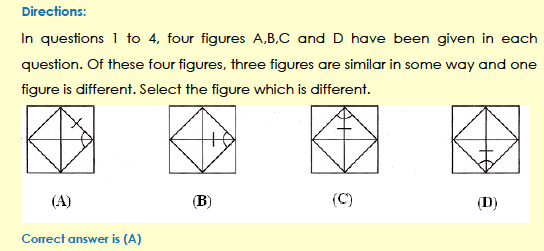
Figure Matching :
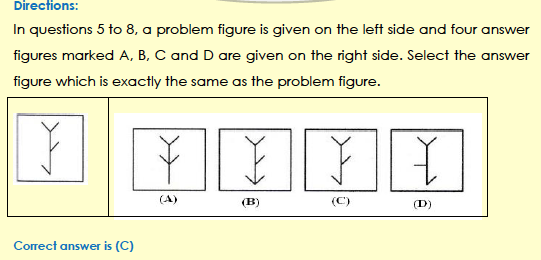
Pattern Completion :
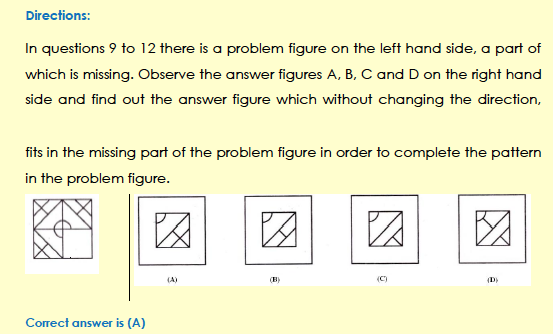
Figure Series Completion :
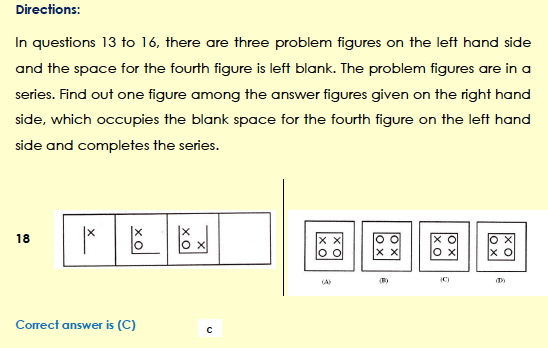
Analogy :
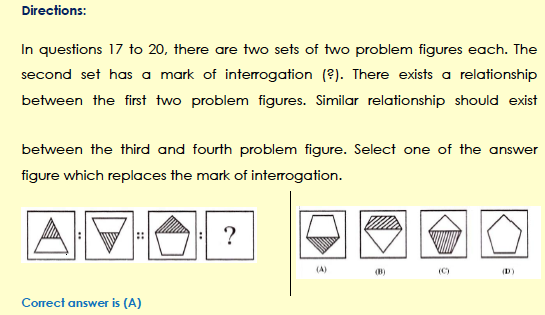
Geometrical Figure Completion (Triangle, Square, Circle)
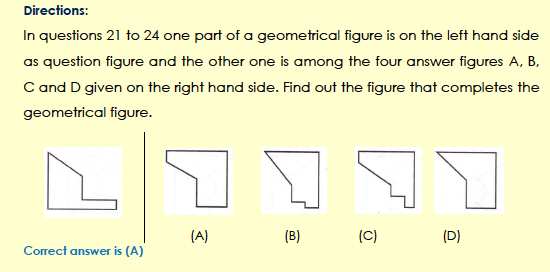
Mirror Imaging :
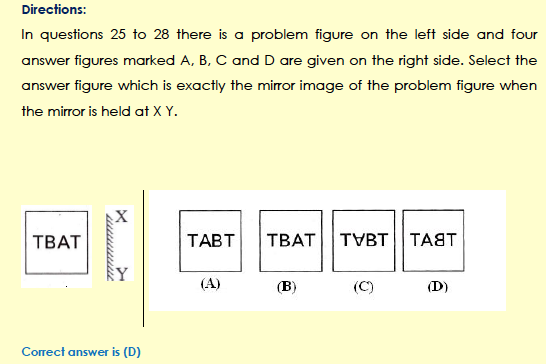
Punched Hold Pattern – Folding/ Unfolding :
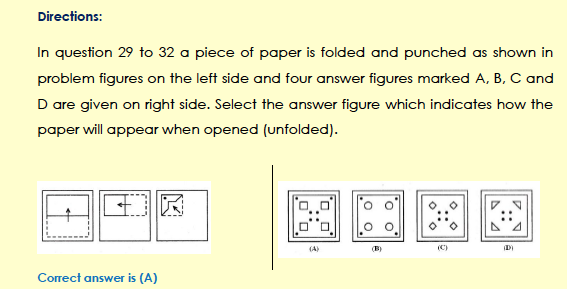
Space Visualization :
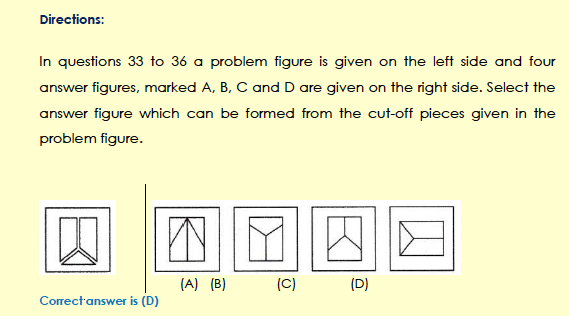
Embedded Figure :
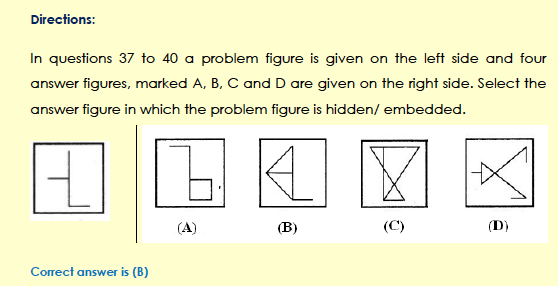
Arithmetic Test (AT :
The Arithmetic Test (AT) section of the Jawahar Navodaya Vidyalaya Selection Test (JNVST) Class 6 Exam assesses the student’s understanding of mathematical concepts and their ability to solve arithmetic problems. The syllabus for AT includes a variety of topics, including:
- Numbers and Number System: Number properties (natural numbers, integers, rational numbers), operations with whole numbers (addition, subtraction, multiplication, division), decimals and fractions, conversion between fractions and decimals, HCF (Highest Common Factor) and LCM (Least Common Multiple) of numbers, estimation and approximation
- Measurement: Length, area, and volume, units of measurement (meter, centimeter, kilometer, square meter, square centimeter, cubic meter, cubic centimeter, etc.), conversion between different units of measurement
- Basic Geometry: Angles (acute, obtuse, right, complementary, supplementary), triangles (scalene, isosceles, equilateral, right-angled), quadrilaterals (square, rectangle, parallelogram, rhombus, trapezium), circles (diameter, circumference, area)
- Mensuration: Perimeter of basic shapes (triangle, square, rectangle, circle), area of basic shapes (triangle, square, rectangle, circle), volume of basic shapes (cube, cuboid)
- Data Handling: Data representation (bar graphs, pie charts, pictograms), interpretation of graphs and tables, average, median, and mode
The AT section of the JNVST Class 6 Exam aims to assess the student’s ability to apply mathematical concepts to solve problems in real-world situations.
Here are some sample questions to illustrate the Arithmetic Test syllabus:
Question 1: Number Properties
Which of the following numbers is a prime number? (a) 1 (b) 2 (c) 4 (d) 6
Answer: (b) 2
Question 2: Operations with Whole Numbers
Find the sum of 25, 37, and 48. (a) 110 (b) 120 (c) 130 (d) 140
Answer: (c) 130
Question 3: Decimals and Fractions
Convert 0.75 to a fraction. (a) 3/4 (b) 1/2 (c) 2/3 (d) 3/5
Answer: (a) 3/4
Question 4: HCF and LCM
Find the HCF of 12 and 18. (a) 2 (b) 3 (c) 6 (d) 9
Answer: (c) 6
Question 5: Measurement
The length of a rectangular garden is 10 meters, and its width is 5 meters. What is the area of the garden? (a) 20 square meters (b) 30 square meters (c) 40 square meters (d) 50 square meters
Answer: (b) 30 square meters
Question 6: Basic Geometry
A triangle has angles measuring 60 degrees, 70 degrees, and 50 degrees. What type of triangle is it? (a) Acute triangle (b) Right-angled triangle (c) Obtuse triangle (d) Equilateral triangle
Answer: (a) Acute triangle
Question 7: Mensuration
The volume of a cube with a side length of 5 cm is: (a) 125 cubic centimeters (b) 65 cubic centimeters (c) 25 cubic centimeters (d) 15 cubic centimeters
Answer: (a) 125 cubic centimeters
Question 8: Data Handling
The following table shows the number of students in each class of a school:
| Class | Number of Students |
|---|---|
| Class 5 | 40 |
| Class 6 | 35 |
| Class 7 | 45 |
| Class 8 | 30 |
What is the average number of students in each class? (a) 37.5 (b) 38 (c) 38.5 (d) 39
Answer: (b) 38
These are just a few examples of the types of questions that students can expect to see on the Arithmetic Test (AT) section of the JNVST Class 6 Exam. By practicing with a variety of sample problems, students can improve their understanding of the syllabus and their ability to solve.
JNVST Class 6th Syllabus 2024 for Arithmetic
JNVST Class 6 Syllabus 2024 for Arithmetic:
Numbers and Number System:
-
Number Properties:
- Natural numbers, integers, rational numbers
- Properties of natural numbers (divisibility, multiples, factors, prime numbers, LCM, HCF)
- Properties of integers (additive inverse, multiplicative inverse, ordering)
- Properties of rational numbers (representation as fractions and decimals)
-
Operations with Whole Numbers:
- Addition, subtraction, multiplication, and division of whole numbers
- Order of operations
- Estimation and approximation
-
Decimals and Fractions:
- Representation of decimals and fractions
- Conversion between decimals and fractions
- Operations with decimals (addition, subtraction, multiplication, division)
- Operations with fractions (addition, subtraction, multiplication, division)
-
HCF (Highest Common Factor) and LCM (Least Common Multiple):
- Finding HCF and LCM of two or more numbers using various methods (factor tree, Euclidean algorithm)
- Applications of HCF and LCM in solving problems
-
Simplification of Numerical Expressions:
- Using BODMAS (Brackets, Of, Multiplication and Division, Addition and Subtraction) rule
- Applying mathematical properties (distributive, associative, commutative)
Measurement:
-
Length:
- Units of length (meter, centimeter, millimeter, kilometer)
- Measurement of length using standard units
- Conversion between different units of length
-
Area:
- Concept of area and its measurement
- Units of area (square meter, square centimeter, square kilometer)
- Calculating area of basic shapes (rectangle, square, triangle, circle)
-
Volume:
- Concept of volume and its measurement
- Units of volume (cubic meter, cubic centimeter, cubic kilometer)
- Calculating volume of basic shapes (cube, cuboid)
Basic Geometry:
-
Angles:
- Types of angles (acute, obtuse, right, complementary, supplementary)
- Measuring angles using a protractor
- Angle relationships (sum of interior angles of a triangle, angle bisector theorem)
-
Triangles:
- Types of triangles (scalene, isosceles, equilateral, right-angled)
- Properties of triangles (sum of interior angles, Pythagorean theorem)
-
Quadrilaterals:
- Types of quadrilaterals (square, rectangle, parallelogram, rhombus, trapezium)
- Properties of quadrilaterals (parallel sides, opposite angles, diagonals)
-
Circles:
- Parts of a circle (diameter, radius, chord, arc, sector)
- Circumference and area of a circle
- Properties of circles (tangents, secants, chords)
Mensuration:
-
Perimeter:
- Concept of perimeter and its measurement
- Calculating perimeter of basic shapes (rectangle, square, triangle, circle)
-
Area:
- Concept of area and its measurement
- Calculating area of basic shapes (rectangle, square, triangle, circle)
- Formulae for area of basic shapes
-
Volume:
- Concept of volume and its measurement
- Calculating volume of basic shapes (cube, cuboid)
Data Handling:
-
Data Representation:
- Representing data using bar graphs, pie charts, pictograms
- Understanding different types of charts and their applications
-
Interpretation of Graphs and Tables:
- Interpreting data presented in graphs and tables
- Drawing inferences and conclusions from data representations
-
Average, Median, and Mode:
- Calculating average, median, and mode of a set of data
- Understanding the significance of average, median, and mode in representing data
This Detailed overview of the JNVST Class 6th Syllabus 2024 for Arithmetic will help students prepare effectively for the upcoming exam. By thoroughly understanding the concepts and practicing with a variety of Problems, students can develop strong mathematical skills and achieve success in the Arithmetic Test.
Sample Questions on Arithmetic :
Here are some sample questions on arithmetic for JNVST Class 6:
Number and Number System
-
What is the HCF of 12 and 18? (a) 2 (b) 3 (c) 6 (d) 9
-
Simplify the expression: 25 + (12 × 4) – 36 (a) 29 (b) 32 (c) 35 (d) 38
-
Convert 0.75 to a fraction. (a) 3/4 (b) 1/2 (c) 2/3 (d) 3/5
Measurement
-
The length of a rectangular garden is 10 meters, and its width is 5 meters. What is the area of the garden? (a) 20 square meters (b) 30 square meters (c) 40 square meters (d) 50 square meters
-
A triangle has angles measuring 60 degrees, 70 degrees, and 50 degrees. What type of triangle is it? (a) Acute triangle (b) Right-angled triangle (c) Obtuse triangle (d) Equilateral triangle
Basic Geometry
-
The diameter of a circle is 14 cm. What is its radius? (a) 7 cm (b) 9 cm (c) 11 cm (d) 13 cm
-
A square has a side length of 8 cm. What is its perimeter? (a) 16 cm (b) 24 cm (c) 32 cm (d) 40 cm
Mensuration
-
The volume of a cube with a side length of 5 cm is: (a) 125 cubic centimeters (b) 65 cubic centimeters (c) 25 cubic centimeters (d) 15 cubic centimeters
-
A rectangular tank has a length of 10 cm, a width of 5 cm, and a height of 4 cm. What is the volume of the tank? (a) 200 cubic centimeters (b) 250 cubic centimeters (c) 300 cubic centimeters (d) 350 cubic centimeters
Data Handling
- The following table shows the number of students in each class of a school:
| Class | Number of Students |
|---|---|
| Class 5 | 40 |
| Class 6 | 35 |
| Class 7 | 45 |
| Class 8 | 30 |
What is the Average Number of students in each class? (a) 37.5 (b) 38 (c) 38.5 (d) 39
These are just a few examples of the types of questions that students can expect to see on the Arithmetic Test (AT) section of the JNVST Class 6 Exam. By practicing with a variety of sample problems, students can improve their understanding of the syllabus and their ability to solve arithmetic problems accurately and efficiently.
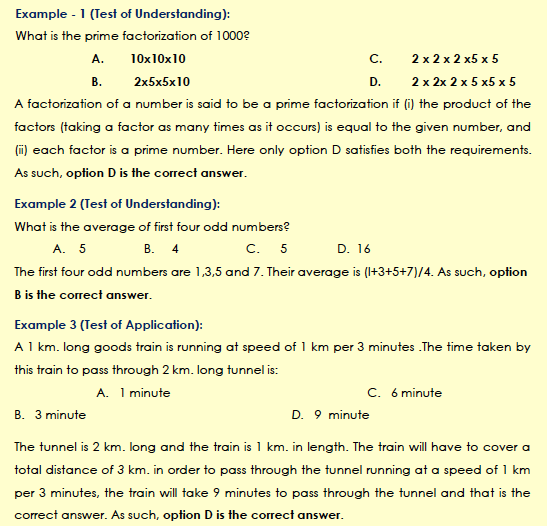
Language Test (LT) :
The Language Test (LT) section of the Jawahar Navodaya Vidyalaya Selection Test (JNVST) Class 6 Exam is designed to assess the student’s comprehension, vocabulary, and language skills in both English and Hindi. The syllabus for LT covers a variety of topics, including:
Reading Comprehension:
- Comprehending passages of varying difficulty levels.
- Identifying main ideas, supporting details, and inferences.
- Recognizing vocabulary used in context and applying it to understand the passage.
- Understanding grammar and sentence structure to enhance comprehension.
Vocabulary:
- Building a strong foundation of words and their meanings.
- Recognizing synonyms, antonyms, and related words.
- Understanding the nuances of word formation (prefixes, suffixes, roots).
- Expanding vocabulary through exposure to various texts and contexts.
Grammar:
- Grasping the fundamentals of grammar, including parts of speech, sentence structure, and tenses.
- Applying grammatical rules to identify errors and improve sentence construction.
- Understanding concord and agreement between different elements in a sentence.
- Recognizing different types of sentences (declarative, interrogative, imperative, exclamatory) and their usage.
Spelling & Writing:
- Mastering the spelling of common words and applying spelling rules consistently.
- Forming grammatically correct sentences with proper subject-verb agreement and verb tenses.
- Writing clear, concise, and coherent paragraphs following the structure of introduction, body, and conclusion.
- Using punctuation marks effectively to enhance clarity and meaning in written communication.
The Language Test (LT) section of the JNVST Class 6 Exam aims to evaluate the student’s proficiency in using language effectively for comprehension, expression, and communication. By practicing with a variety of reading passages, vocabulary exercises, grammar drills, and writing prompts, students can improve their language skills and achieve success in this section of the exam.
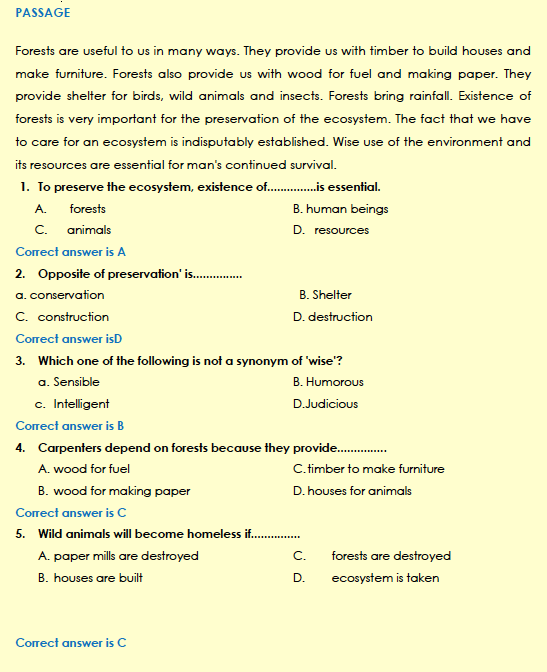
How to fill Answers & Details in OMR in JNVST
Filling out the OMR sheet accurately is crucial for ensuring that your answers are recorded correctly in the JNVST exam. Here’s a step-by-step guide on how to fill in answers and details in the OMR sheet for JNVST:
1. Check the OMR Sheet:
- Before you start filling in the OMR sheet, carefully examine it to ensure that it is complete and free from any defects. Check for missing or faded markings, incorrect question numbers, or any other irregularities that could affect your answers.
2. Fill in Personal Information:
- Locate the section on the OMR sheet designated for personal information. Fill in your details legibly and accurately, including your name, roll number, and other relevant information.
3. Read the Instructions Carefully:
- Before you start filling in the answer bubbles, carefully read the instructions provided on the OMR sheet. Understand the marking scheme and the specific format for selecting answers.
4. Mark Answers for Each Section:
- For each question, identify the correct answer from the options given. Locate the corresponding answer bubbles for that question on the OMR sheet. Using a dark pencil, fill in the bubble completely and firmly. Avoid making stray marks or filling in multiple bubbles for the same question.
5. Double-check Your Answers:
- Once you have filled in the answer bubbles for all the questions, take a moment to review your answers. Double-check that you have marked the correct answers for each question and that you have not missed any bubbles.
6. Fill in Bubble for Subject Code:
- Locate the designated section on the OMR sheet for filling in the subject code. Use the provided code or follow the instructions given to accurately mark the correct subject code bubble.
7. Fill in Bubble for Exam Center Code:
- Similarly, locate the designated section for filling in the exam center code. Use the provided code or follow the instructions given to accurately mark the correct exam center code bubble.
8. Hand Over the OMR Sheet:
- Once you have completed filling in the OMR sheet, carefully hand it over to the exam supervisor, ensuring that it is not folded or crumpled.
Remember to handle the OMR sheet with care and avoid making any unnecessary marks or smudges. Follow the instructions provided on the OMR sheet and double-check your answers before submitting it.
JNVST Class 6th Examination Language
The Jawahar Navodaya Vidyalaya Selection Test (JNVST) Class 6 examination is conducted in both English and Hindi. Students can choose to answer the questions in either language, or they can answer some questions in English and others in Hindi. The choice of language is up to the student.
Here are some of the benefits of choosing to answer the JNVST Class 6 exam in Hindi:
- It can help students who are more comfortable using Hindi to perform better on the exam.
- It can give students who are not native speakers of English a more level playing field.
- It can help students who are from rural areas to feel more confident and comfortable during the exam.
Here is a table summarizing the languages of instruction for the JNVST Class 6 exam:
| Section | Language of Instruction |
|---|---|
| Mental Ability Test (MAT) | English and Hindi |
| Arithmetic Test (AT) | English and Hindi |
| Language Test (LT) | English and Hindi |
Here are some of the benefits of choosing to answer the JNVST Class 6 exam in English:
- It can help students who are planning to attend an English-medium school to prepare for the rigors of English-language instruction.
- It can help students who are planning to pursue higher education in India or abroad to develop their English language skills.
- It can open up more career opportunities for students in the future.
Ultimately, the decision of which language to choose for the JNVST Class 6 exam is a personal one. Students should weigh the pros and cons of each option and choose the language that they feel most comfortable with.
| State/UT | Languages |
| Andaman & Nicobar Islands | Hindi, English, Tami, Urdu, Bengali |
| Andhra Pradesh | Hindi, English, Telugu, Marathi, Urdu, Oriya, Kannada |
| Arunachal Pradesh | English, Hindi |
| Assam | English, Hindi, Assamese, Bodo, Garo, Bengali, Manipuri (Bongio Script), Manipuri (Meitei Mayek) |
| Bihar | English, Hindi, Urdu |
| Chandigarh | English, Hindi, Punjabi |
| Chhattisgarh | English, Hindi |
| Delhi | English, Hindi |
| Goa | English, Hindi, Marathi, Kannada |
| Gujarat | English, Hindi, Gujarati, Marathi |
| Haryana | English, Hindi |
| Himachal Pradesh | English, Hindi |
| Jammu And Kashmir | English, Hindi, Urdu |
| Jharkhand | English, Hindi, Urdu, Oriya |
| Karnataka | Hindi, English, Konnodo, Telugu, Marathi, Urdu, Malayalam, Tamil |
| Kerala | Hindi, English, Malayalam, Tamil, Kannada |
| Lakshadweep | Hindi, English, Malayalam |
| Madhya Pradesh | English, Hindi, Urdu, Marathi, Gujarati |
| Maharashtra | English, Hindi, Kannada, Marathi, Urdu, Telugu, Gujarati |
| Manipur | English, Hindi, Manipuri, Meitei Mayek |
| Meghalaya | English, Hindi, Khosi, Garo, Bengali, Assamese |
| Mizoram | English, Hindi, Mizo |
| Nagaland | English, Hindi |
| Odisha | English, Hindi, Telugu, Oriya, Urdu |
| Puducherry | English, Tamil, Telugu, Malayalam, Hindi |
| Punjab | English, Hindi, Punjabi |
| Rajasthan | English, Hindi |
| Sikkim | English, Hindi, Nepali |
| Telangana | Hindi, Enafish, Telugu, Kannada, Merati, Urdu |
| Tripura | English, Hindi, Bengali |
| UT Ladakh | English, Hindi, Urdu |
| UT of Dadar & Nagar Haveli and Damon & Diu | English, Hindi, Gujarati, Marathi |
| Uttar Pradesh | English, Hindi, Urdu |
| Uttarakhand | English, Hindi, Urdu |
| West Bengal | English, Hindi, Bengali, Nepal, Urdu |
JNVST Class 6 Preparation Tips 2024 :
Here are some tips to help you prepare for the JNVST Class 6 exam in 2024:
1. Start Early and Prepare Thoroughly
Effective preparation requires ample time and dedication. Begin your preparation well in advance of the exam, allowing sufficient time to grasp the concepts, practice solving problems, and revise the syllabus thoroughly.
2. Understand the Exam Pattern and Syllabus
Familiarize yourself with the exam pattern, including the types of questions, the number of questions, and the time allotted for each section. This will help you plan your study strategy and time management effectively.
3. Utilize Study Materials (NCERT Textbooks, Arihant Books)
Gather relevant study materials, including NCERT textbooks and recommended practice books. NCERT textbooks provide a comprehensive understanding of the syllabus, while practice books offer a variety of questions to enhance your problem-solving skills.
4. Focus on Conceptual Understanding
Mere memorization of formulas or facts will not suffice. Strive to grasp the underlying concepts and principles behind each topic. This will enable you to apply your knowledge to solve diverse problems and adapt to different question formats.
5. Practice Regularly and Solve Sample Papers
Regular practice is crucial for improving your speed, accuracy, and problem-solving skills. Solve a variety of sample papers and previous year question papers to familiarize yourself with the exam pattern and identify areas that require further attention.
6. Strengthen Your Weak Areas
Analyze your performance in practice tests and identify areas where you struggle. Dedicate extra time to understanding and practicing these weak areas to improve your overall performance.
7. Revise Regularly and Make Notes
Regular revision is essential for retaining information and consolidating your understanding. Create concise notes and diagrams to summarize key concepts and formulas for quick reference during revision.
8. Time Management and Exam Strategy
Develop a time management strategy that allows you to complete each section within the allocated time. Prioritize questions based on your confidence level and avoid spending too much time on any particular question.
9. Maintain a Healthy Lifestyle
Ensure you get enough sleep, eat a balanced diet, and engage in regular physical activity. A healthy lifestyle will enhance your focus, concentration, and overall well-being during the exam.
10. Stay Calm and Confident
Approach the exam with a calm and confident mindset. Avoid overthinking or dwelling on mistakes during the exam. Believe in your preparation and focus on giving your best effort.
Remember, consistent effort and a positive approach will be key to your success in the JNVST Class 6 exam.
What is Navodaya Syllabus ?
The Jawahar Navodaya Vidyalaya Selection Test (JNVST) syllabus for Class 6 covers a wide range of topics in English, Hindi, and Mathematics. The exam is designed to assess the students’ understanding and skills in these subjects.
English
-
Reading Comprehension: The student should be able to read and comprehend passages of varying difficulty levels. They should be able to identify the main idea, supporting details, and inferences. They should also be able to understand vocabulary used in context and apply it to understand the passage.
-
Vocabulary: The student should have a strong vocabulary foundation. They should be able to recognize synonyms, antonyms, and related words. They should also be able to understand the nuances of word formation (prefixes, suffixes, roots).
-
Grammar: The student should have a strong understanding of grammar, including parts of speech, sentence structure, and tenses. They should be able to apply grammatical rules to identify errors and improve sentence construction. They should also be able to understand concord and agreement between different elements in a sentence.
-
Spelling & Writing: The student should be able to spell common words correctly and apply spelling rules consistently. They should be able to form grammatically correct sentences with proper subject-verb agreement and verb tenses. They should also be able to write clear, concise, and coherent paragraphs following the structure of introduction, body, and conclusion. They should also be able to use punctuation marks effectively to enhance clarity and meaning in written communication.
Hindi
- Same as English syllabus but in Hindi language.
Mathematics
-
Numbers and Number System: The student should have a strong understanding of numbers and their properties. They should be able to identify and perform operations on natural numbers, integers, rational numbers, and real numbers.
-
Operations with Whole Numbers: The student should be able to perform addition, subtraction, multiplication, and division of whole numbers. They should also be able to apply order of operations.
-
Decimals and Fractions: The student should be able to represent decimals and fractions. They should be able to convert between decimals and fractions. They should also be able to perform operations on decimals and fractions.
-
Measurement: The student should be able to measure length, area, volume, and time. They should be able to convert between different units of measurement.
-
Basic Geometry: The student should have a basic understanding of angles, triangles, quadrilaterals, circles, and solids. They should be able to identify and apply properties of these shapes.
-
Mensuration: The student should be able to calculate perimeter, area, and volume of basic shapes. They should also be able to apply formulas for area and volume of basic shapes.
Data Handling:
-
Data Representation: The student should be able to represent data using bar graphs, pie charts, and pictograms. They should be able to understand different types of charts and their applications.
-
Interpretation of Graphs and Tables: The student should be able to interpret data presented in graphs and tables. They should be able to draw inferences and conclusions from data representations.
-
Average, Median, and Mode: The student should be able to calculate average, median, and mode of a set of data. They should be able to understand the significance of average, median, and mode in representing data.
Is there Any Negative Marking in JNVST 2024 Exam ?
No, there is No Negative Marking in the JNVST 2024 Exam. This means that students will not be penalized for incorrect answers. Only correct answers will be awarded marks. This policy is in place to encourage students to attempt all questions and avoid making careless mistakes.
Therefore, students should not be afraid to attempt all of the questions on the JNVST 2024 exam. Even if they are unsure of an answer, they should make a guess, as there is no penalty for incorrect answers.
Here is a table summarizing the Marking Scheme for the JNVST 2024 Exam:
| Section | Mark per Correct Answer | Negative Marking |
|---|---|---|
| Mental Ability Test (MAT) | 1.25 | No |
| Arithmetic Test (AT) | 1.25 | No |
| Language Test (LT) | 1 | No |
How Many Marks is the Navodaya Exam ?
The Jawahar Navodaya Vidyalaya Selection Test (JNVST) is conducted for admission to Class 6 and Class 9 in Jawahar Navodaya Vidyalayas across India. The total marks for the JNVST exam varies depending on the class.
-
For Class 6: The total marks for the JNVST Class 6 exam is 100. The exam consists of three sections: Mental Ability Test (MAT), Arithmetic Test (AT), and Language Test (LT). Each section has 33.33% weightage in the overall score.
-
For Class 9: The total marks for the JNVST Class 9 exam is also 100. The exam consists of three sections: Mental Ability Test (MAT), Arithmetic Test (AT), and Language Test (LT). Each section has 33.33% weightage in the overall score.
Here is a table summarizing the total marks and section-wise weightage for the JNVST Exam:
| Class | Total Marks | Section | Weightage (%) |
|---|---|---|---|
| Class 6 | 100 | Mental Ability Test (MAT) | 33.33 |
| Arithmetic Test (AT) | 33.33 | ||
| Language Test (LT) | 33.33 | ||
| Class 9 | 100 | Mental Ability Test (MAT) | 33.33 |
| Arithmetic Test (AT) | 33.33 | ||
| Language Test (LT) | 33.33 |
How do I Qualify for the Navodaya Exam ?
To qualify for the Jawahar Navodaya Vidyalaya Selection Test (JNVST) and secure admission to a Jawahar Navodaya Vidyalaya (JNV), you must meet the following eligibility criteria and perform well in the exam:
-
Age Eligibility:
- For Class 6: Born on or after 1st May 2012
- For Class 9: Born on or after 1st May 2009
-
Academic Eligibility:
- Studying in Class 5 for Class 6 admission
- Studying in Class 8 for Class 9 admission
-
Residential Status:
- Must be a resident of the concerned district in which the JNV is located, or
- Must have studied for at least two years in a recognized school located in the concerned district
-
Examination Pattern:
- The JNVST exam consists of three sections: Mental Ability Test (MAT), Arithmetic Test (AT), and Language Test (LT)
- Each section carries 33.33% weightage in the overall score
- The exam is conducted in both English and Hindi
-
Qualifying Marks:
- The qualifying marks for the JNVST exam are determined by the Jawahar Navodaya Vidyalaya Samiti (NVS) based on the overall performance of the candidates
- Generally, candidates scoring the highest marks within the cut-off are considered for admission
To increase your chances of qualifying for the JNVST exam, follow these tips:
-
Thorough Preparation:
- Start preparing early and cover the entire syllabus thoroughly.
- Utilize NCERT textbooks and recommended practice books.
- Solve sample papers and previous year question papers regularly.
- Focus on understanding concepts and applying them to solve problems.
-
Time Management:
- Practice managing your time effectively during mock tests.
- Allocate sufficient time to each section and prioritize questions based on your confidence level.
- Avoid spending too much time on any one question and move on if you are stuck.
-
Stay Stress-Free:
- Maintain a healthy lifestyle and get enough sleep.
- Avoid overthinking or panicking about the exam.
- Visualize yourself performing well and believe in your abilities.
Remember, consistent effort, a positive attitude, and effective preparation will increase your chances of success in the JNVST exam and secure admission to a Jawahar Navodaya Vidyalaya.
What is the age limit for JNV Class 6 2024?
The Age limit for JNV Class 6 admission in 2024 is as follows:
- A Candidate seeking admission must not have been born before 1st May 2012 and after 31st July 2014 (Both dates are inclusive).
This means that students who are born between May 1, 2012, and July 31, 2014, are eligible to apply for JNV Class 6 admission in 2024.
The age limit is strictly enforced, and there are no exceptions. Students who do not meet the age limit will not be allowed to take the JNVST exam or be considered for admission to JNVs.
The reason for the age limit is to ensure that all students admitted to Class 6 are of a similar age and maturity level. This helps to create a more equitable and supportive learning environment for all students.
What is the Syllabus of Nnavodaya Class 6th?
The syllabus for Class 6 of the Jawahar Navodaya Vidyalaya Selection Test (JNVST) covers a wide range of topics in English, Hindi, and Mathematics. Here is a detailed breakdown of the syllabus:
English
-
Reading Comprehension: Students should be able to read and understand passages of varying difficulty levels, identify the main idea, supporting details, and inferences, and comprehend vocabulary used in context and apply it to understand the passage.
-
Vocabulary: Students should have a strong vocabulary foundation, recognizing synonyms, antonyms, and related words, and understanding the nuances of word formation (prefixes, suffixes, roots).
-
Grammar: Students should have a firm grasp of grammar, including parts of speech, sentence structure, and tenses, applying grammatical rules to identify errors and improve sentence construction.
-
Spelling and Writing: Students should spell common words correctly and apply spelling rules consistently, form grammatically correct sentences with proper subject-verb agreement and verb tenses, write clear, concise, and coherent paragraphs following the structure of introduction, body, and conclusion, and effectively use punctuation marks to enhance clarity and meaning in written communication.
Hindi
The syllabus for Hindi follows the same structure as English, encompassing reading comprehension, vocabulary, grammar, and spelling and writing. Students are expected to demonstrate proficiency in understanding and using the Hindi language effectively.
Mathematics
-
Numbers and Number System: Students should have a strong understanding of numbers and their properties, identifying and performing operations on natural numbers, integers, rational numbers, and real numbers.
-
Operations with Whole Numbers: Students should be able to perform addition, subtraction, multiplication, and division of whole numbers, applying order of operations.
-
Decimals and Fractions: Students should be able to represent decimals and fractions, convert between decimals and fractions, and perform operations on decimals and fractions.
-
Measurement: Students should be able to measure length, area, volume, and time, converting between different units of measurement.
-
Basic Geometry: Students should have a basic understanding of angles, triangles, quadrilaterals, circles, and solids, identifying and applying properties of these shapes.
-
Mensuration: Students should be able to calculate perimeter, area, and volume of basic shapes, applying formulas for area and volume of basic shapes.
In addition to the syllabus, there is a focus on data handling, where students should be able to represent data using bar graphs, pie charts, and pictograms, interpret data presented in graphs and tables, and calculate average, median, and mode of a set of data.
The overall goal of the JNVST Class 6th syllabus is to assess students’ understanding of fundamental concepts and their ability to apply them to solve problems. Students are encouraged to develop a strong foundation in English, Hindi, and Mathematics, preparing them for further academic success.
What is the Passing Marks of Navodaya Exam 2023 Class 6th?
The minimum passing marks for the Jawahar Navodaya Vidyalaya Selection Test (JNVST) Class 6th exam in 2023 vary depending on the candidate’s category.
Here’s a table summarizing the minimum passing marks for each category:
| Category | Minimum Passing Marks |
|---|---|
| General | 70-75 |
| OBC | 65-70 |
| EWS | 65-70 |
| SC | 55-60 |
| PWD | 45-50 |
Please note that these marks are based on the results of the 2023 JNVST exam and may vary for future exams. The Jawahar Navodaya Vidyalaya Samiti (NVS) will announce the official cut-off marks for the 2024 JNVST exam before the exam is conducted. Candidates can find the cut-off marks on the official NVS website.In addition to the minimum passing marks, candidates must also meet the overall eligibility criteria to be considered for admission to a Jawahar Navodaya Vidyalaya (JNV). This includes age, academic qualifications, and residential status.
What is the Full Marks of Navodaya Exam ?
The full marks for the Jawahar Navodaya Vidyalaya Selection Test (JNVST) is 100 marks for both Class 6 and Class 9 admissions. The exam consists of three sections: Mental Ability Test (MAT), Arithmetic Test (AT), and Language Test (LT). Each section carries 33.33% weightage in the overall score.
Here’s a table summarizing the marks distribution for each section:
| Section | Marks |
|---|---|
| Mental Ability Test (MAT) | 33⅓ |
| Arithmetic Test (AT) | 33⅓ |
| Language Test (LT) | 33⅓ |
Candidates are evaluated based on their performance in all three sections. The minimum passing marks vary depending on the candidate’s category, but the overall weightage of each section remains the same.
When was Navodaya Exam in 2024 ?
The Jawahar Navodaya Vidyalaya Selection Test (JNVST) for Class 6 was held on November 4, 2023, and the exam for Class 9 is scheduled for February 10, 2024. The JNVST is conducted annually to select students for admission to Jawahar Navodaya Vidyalayas (JNVs), which are a system of residential schools in India.
The JNVST for Class 6 is conducted in two phases, with Phase 1 held on November 4, 2023, and Phase 2 scheduled for January 20th, 2024. The exam for Class 9 is held in a single phase, which is scheduled for February 10, 2024.
The JNVST is a Competitive exam, and only a small fraction of applicants are selected for admission. However, the JNVs offer a high-quality education that is affordable for students from all socioeconomic backgrounds. As a result, the JNVST is a popular exam for students who are looking for a good education and a chance to succeed in life.
FAQs on JNVST Class 6th Detailed Syllabus 2024 :
What is the JNVST?
The Jawahar Navodaya Vidyalaya Selection Test (JNVST) is a national level entrance exam conducted for admission to Class 6 and Class 9 in Jawahar Navodaya Vidyalayas (JNVs) across India.
Who is eligible for the JNVST?
To be eligible for the JNVST, candidates must meet the following criteria:
-
Age Eligibility:
- For Class 6th: Born on or after 1st May 2012
- For Class 9th: Born on or after 1st May 2009
-
Academic Eligibility:
- Studying in Class 5 for Class 6 admission
- Studying in Class 8 for Class 9 admission
-
Residential Status:
- Must be a resident of the concerned district in which the JNV is located, or
- Must have studied for at least two years in a recognized school located in the concerned district
What is the exam pattern for the JNVST?
The JNVST exam consists of three sections:
-
Mental Ability Test (MAT): Assesses the candidate’s reasoning ability, problem-solving skills, and spatial reasoning.
-
Arithmetic Test (AT): Assesses the candidate’s understanding of mathematical concepts and their ability to solve arithmetic problems.
-
Language Test (LT): Assesses the candidate’s proficiency in English and Hindi, including reading comprehension, vocabulary, grammar, and spelling.
Each section carries 33.33% weightage in the overall score. The exam is conducted in both English and Hindi.
What is the marking scheme for the JNVST?
There is no negative marking in the JNVST exam. Only correct answers will be awarded marks. Each correct answer in the MAT and AT will be awarded 1.25 marks, while each correct answer in the LT will be awarded 1 mark.
When and where is the JNVST conducted?
The JNVST is usually conducted in the month of February or March every year. The exam is conducted at various centers across India. The exact dates and centers for the exam are notified by the Jawahar Navodaya Vidyalaya Samiti (NVS) in advance.
How can I apply for the JNVST?
Applications for the JNVST are usually invited in the month of December or January every year. Candidates can apply online through the official website of the NVS. The application process involves filling up an online form, uploading necessary documents, and paying the application fee.
How can I prepare for the JNVST?
Here are some tips for preparing for the JNVST:
-
Thorough Preparation:
- Start preparing early and cover the entire syllabus thoroughly.
- Utilize NCERT textbooks and recommended practice books.
- Solve sample papers and previous year question papers regularly.
- Focus on understanding concepts and applying them to solve problems.
-
Time Management:
- Practice managing your time effectively during mock tests.
- Allocate sufficient time to each section and prioritize questions based on your confidence level.
- Avoid spending too much time on any one question and move on if you are stuck.
-
Stay Stress-Free:
- Maintain a healthy lifestyle and get enough sleep.
- Avoid overthinking or panicking about the exam.
- Visualize yourself performing well and believe in your abilities.
What is the selection process for admission to JNVs?
The selection process for admission to JNVs is based on the candidate’s performance in the JNVST exam. The candidates are shortlisted for admission based on their merit and a merit list is prepared. The shortlisted candidates are then called for counseling and medical examination.
Are there any scholarships available for JNV students?
Yes, there are various scholarships available for JNV students. These scholarships are provided to students from economically disadvantaged backgrounds to support their education. The scholarships cover tuition fees, hostel fees, and other expenses.

